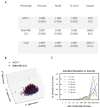Cell-morphodynamic phenotype classification with application to cancer metastasis using cell magnetorotation and machine-learning
- PMID: 34788313
- PMCID: PMC8598033
- DOI: 10.1371/journal.pone.0259462
Cell-morphodynamic phenotype classification with application to cancer metastasis using cell magnetorotation and machine-learning
Abstract
We define cell morphodynamics as the cell's time dependent morphology. It could be called the cell's shape shifting ability. To measure it we use a biomarker free, dynamic histology method, which is based on multiplexed Cell Magneto-Rotation and Machine Learning. We note that standard studies looking at cells immobilized on microscope slides cannot reveal their shape shifting, no more than pinned butterfly collections can reveal their flight patterns. Using cell magnetorotation, with the aid of cell embedded magnetic nanoparticles, our method allows each cell to move freely in 3 dimensions, with a rapid following of cell deformations in all 3-dimensions, so as to identify and classify a cell by its dynamic morphology. Using object recognition and machine learning algorithms, we continuously measure the real-time shape dynamics of each cell, where from we successfully resolve the inherent broad heterogeneity of the morphological phenotypes found in a given cancer cell population. In three illustrative experiments we have achieved clustering, differentiation, and identification of cells from (A) two distinct cell lines, (B) cells having gone through the epithelial-to-mesenchymal transition, and (C) cells differing only by their motility. This microfluidic method may enable a fast screening and identification of invasive cells, e.g., metastatic cancer cells, even in the absence of biomarkers, thus providing a rapid diagnostics and assessment protocol for effective personalized cancer therapy.
Conflict of interest statement
The authors have declared that no competing interests exist.
Figures




References
-
- Institute for Health Metrics and Evaluation (IHME). Findings from the Global Burden of Disease Study 2017. Seattle, WA: IHME, 2018.
Publication types
MeSH terms
Grants and funding
LinkOut - more resources
Full Text Sources
Other Literature Sources

